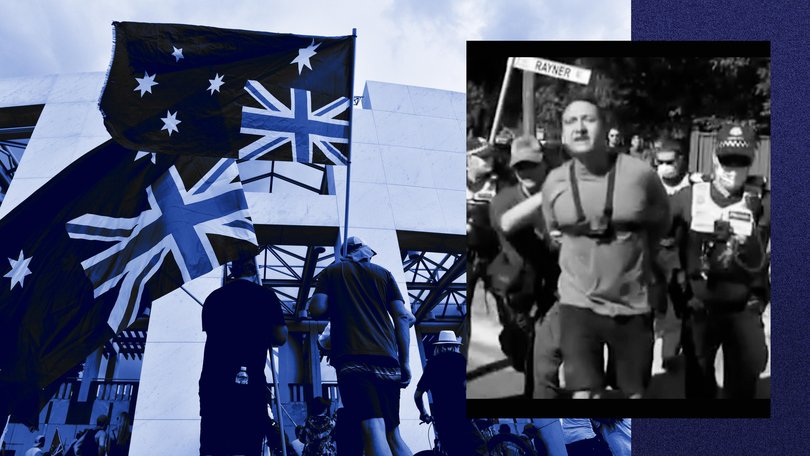Ex-magistrate says sovereign citizen shooting ‘predictable’, calls for inquiry into growing threat

A former magistrate who has faced death threats from “sovereign citizens” has called for a national inquiry into the conspiracy movement and register following the fatal ambush in rural Victoria on Tuesday.
David Heilpern described the deadly shooting of two police officers in Porepunkah — allegedly by radical conspiracy theorist Dezi Freeman — as “tragic” but also “quite predictable”.
The magistrate-turned-academic said the sovereign citizen movement was a “recipe for anarchy and for violence” and only growing in Australia.
Sign up to The Nightly's newsletters.
Get the first look at the digital newspaper, curated daily stories and breaking headlines delivered to your inbox.
By continuing you agree to our Terms and Privacy Policy.“I can’t think of any other movement in Australia’s recent political or legal history where four police officers have been killed,” the dean of law at Southern Cross University said, referencing the two police offices shot and killed by conspiracy theory extremists on a Wieambilla property in rural Queensland in December 2022.
“People at the extreme edge of the sovereign citizen movement are really dangerous and pose a threat to the safety of the community.”
Freeman was known by police as a “sovereign citizen” with a self-confessed hatred of police and association with pseudo-law.
Freeman had labelled police “terrorist thugs”, “frigging nazis” and “Gestapo”, attempted to arrest a magistrate, and was involved in an attempt to have former-Victorian premier Daniel Andrews tried for treason during COVID.
Professor Heilpern said the movement had exploded since the COVID pandemic and the Convoy to Canberra protest outside Parliament House in early 2022.
He said people believed public health driven-rules, such as masks, vaccinations and border lockdowns, were an invasion of their rights.
During his time as magistrate, Professor Heilpern faced many sovereign citizens including matters that stretched out for hours due to pseudo-law disputes. and ones that ended in death threats.
He said traffic infringements were often a gateway for people to engage in the community, with online groups urging people to adopt common law principles.
He called for measures to shut down what he called “starter” websites or social media accounts that were drawing people into conspiracies. He called for a national register for sovereign citizens.
“Prevention is a hell of a lot easier than a cure when it comes to someone who falls down the rabbit hole of sovereign citizenship,” he said.
“I’ve been calling for the shutting down of sovereign citizen websites that are for profit. They can attract tens of thousands of subscribers and introduce people to sovereign citizenship.
“It’s sucking in vulnerable members of the community and encouraging them to lie to courts, encouraging them to put forward arguments that are doomed to failure.”
Professor Heilpern said while sovereign citizenship was cult-like, individuals didn’t all follow the same beliefs.
“There is no cult leader, there’s no guru, there’s no Bible, and there’s no single set of rules,” he said.
He added that people falling into pseudo-law rabbit holes could transcend class and upbringing but were generally angry and alienate Australians.
“It crosses all classes and races and geographic barriers. It’s a delusion that is Australia-wide,” he said.
“I think that your average sovereign citizen is somebody who is feeling aggrieved for a variety of reasons. Perhaps it’s past trauma, an experience with the law or the criminal justice system, a family law issue or because they feel that loss of control that we all sort of feel at the enormity and the complexity of the state.
“It’s becoming more and more common in every jurisdiction around Australia.”
Anthony Albanese has dubbed the movement in Australia as a “real concern” to national security on Tuesday.
The Prime Minister said the nation had been shocked and saddened by the recent deaths of a 59-year-old detective and a 35-year-old senior constable.
“It’s of real concern and ASIO has warned that this threat is very real and that we need to be very vigilant about it,” the Prime Minister told ABC.
“Mike Burgess, the director-general of ASIO, has been warning about far right extremism. We have seen that spread.”
Mr Burgess warned about domestic far-right extremism in his 2022 annual threat assessment speech, saying individuals with “anti-government sovereign citizen beliefs” posed a risk of escalation.
Shadow home affairs minister Andrew Hastie said he had noticed a “breakdown in trust for governments” since COVID and said politicians had to “work extra hard to win the trust” of Australians.
“It’s a worrying development. A lot of people went down the rabbit hole during COVID and they never came back up,” he said.
“There’s more misinformation and disinformation out there.
“Whether it’s the far right or the far left, the thing they both have in common is a rejection of the rule of law.
“I think fundamentally, our task is to make the case for our values as a democracy, which includes parliamentary democracy, but rule of law. Everyone is subject to it.”
Independent Wentworth MP Allegra Spender added that Australia should be “concerned” and acting to stem fringe extreme groups in society: “I think we should be concerned about all sorts of extremists. It’s a stark reminder of… the impact of those fringe groups.”
